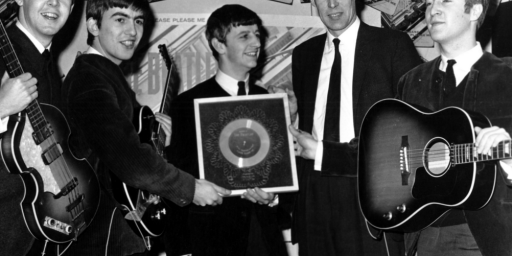RIAA Sues Over Personal Use Copying
It would appear that the recording industry isn’t quite done with its years-long project of immolating itself rather than adapt to changing technology. Having apparently determined that the fact that they won some judgments in the course of their quixotic quest against file sharing proves that they were right to engage in it, no matter the public relations cost, they now want to go after consumers who make personal copies of music CDs they’ve paid for:
In legal documents in its federal case against Jeffrey Howell, a Scottsdale, Ariz., man who kept a collection of about 2,000 music recordings on his personal computer, the industry maintains that it is illegal for someone who has legally purchased a CD to transfer that music into his computer.
The industry’s lawyer in the case, Ira Schwartz, argues in a brief filed earlier this month that the MP3 files Howell made on his computer from legally bought CDs are “unauthorized copies” of copyrighted recordings.
Obviously, I haven’t seen the legal documents filed (and this isn’t my area of expertise) but such a claim would seem to fall under 17 USC 10. It’s not clear how this lunacy squares with 17 USC 1008:
No action may be brought under this title alleging infringement of copyright based on the manufacture, importation, or distribution of a digital audio recording device, a digital audio recording medium, an analog recording device, or an analog recording medium, or based on the noncommercial use by a consumer of such a device or medium for making digital musical recordings or analog musical recordings.
The intent of the statute (which was, it is worth noting, written 15 years ago) is pretty clearly to prevent commercial piracy while protecting consumers who simply make archive copies, mix tapes, and the like. But, having scanned over the statute, it must be acknowledged that the definitions relating to the “devices” in question do not explicitly include personal computers. As such, I suppose one could make a non-frivolous argument that personal recordings on personal computers aren’t included in the lawsuit exclusion. In short, this ham-fisted nonsense is based on a very tendentious parsing of a statute which has become mildly ambiguous because Congress hasn’t updated it recently in light of new technology.
This whole episode reminds me, as so many things do, of the immortal wisdom of Real Genius:
Professor Hathaway: That’s a wonderful story, Bodie. I noticed you’ve stopped stuttering.
Bodie: I’ve been giving myself shock treatments.
Professor Hathaway: Up the voltage.
UPDATE (1/7/08):
Never mind. It turns out that the reporter simply got it wrong:
According to the brief, the authorized copies Howell made became unauthorized copies once Howell put them in a shared folder, presumably the Kazaa shared folder…. If you rip a CD and place the MP3s into a folder to which only you have access, the copies are authorized. If the files are in a shared folder, they’re “available” to third parties, which is a copyright violation….
[T]he RIAA did not argue that ripping a CD you legally own is illegal or that “the act of transferring music from a legally-purchased CD is in and of itself illegal, even if the file is not being shared.”
That’s what I get for trusting that a journalist for a major national paper would actually get the story right. Patterico sees vindication for Helen Thomas in this tale.






And I’ll bet they can’t figure out why people don’t want to buy.
The music industry needs to just realize that the sale of music has hit the MP3 age, and there isn’t any way to stop it.
People don’t want to buy a CD for $15 with 13 songs they don’t like to listen to 2 or 3 songs they do like, not when they can spend a couple of bucks or so, put it in their MP3’s and/or burn it onto a CD with all songs they like.
The industry needs to get on board this train now, and advocate meaningful copyright law, if they don’t it is going to leave the station without them.
I would say its time for me to boycott the RIAA, but I already started that years ago.
If they’re successful in this tactic, it will mostly demonstrate that judges (and legislators) are technologically illiterate. On a conventional PC-type computer it’s impossible to run any program without transcribing i.e. copying it from the permanent store (hard drive, CD, DVD, USB drive, what have you) to the temporary store (RAM). That’s practically the definition of a Von Neumann computer.
Unless software license agreements are written very carefully with this in mind (I don’t recall seeing any that were), that means that either the argument cited in the body of the post is nonsense, computer users are in violation of their license agreements simply by using their software as directed by its supplier, or different media will be treated differently under the law despite the fact that what’s actually happening behind the scenes of their computers, CD players, and DVD players may be the same.
We are in serious need of a revision in copyright law starting with a repeal of the Copyright Act of 1999. It was idiotic to start out with.
I liked Radley Balko’s point (via Yglesias) that Hillary Clinton says she listens to the Beatles on her iPod, and that the RIAA should therefore sue her if it has any consistency.
Me, I just wish they would sue her so I could see all the Republican candidates (and blog commenters) come out unanimously against personal-use copying of one’s own CD’s. The Menckenesque spring in my step would last for days.
If the RIAA truly believed this stupidity, they would’ve (long ago) filed suit against Apple. Given the extent to which Itunes automates and idiot-proofs the ripping process, under the ‘no fair use’ theory Apple would clearly be an accessory-before-the-fact to untold millions of “thefts” annually.
Dave,
Traditionally the computer as a whole is treated as a singular “device”, such that copying from one part of the device to another doesn’t constitute 2 separate copies. This gets gray when you talk about CDs, flash drives, network storage or distributed virtualization. Some software licenses actually try to account for these (especially virtualization). In the end “device” is a nebulous description.
just me,
The recording industry is starting to get it, with many offering DRM-free downloads, and EMI even rumored to be pulling out of the RIAA. It would be fitting if the RIAA ceased to exist because it’s member companies realized it was costing them more sales than it protected.
I’d like to believe that this insanity will prompt people to look beyond the RIAA and realize the whole concept of IP is just bad…
…but there are way too many people making money off of IP for that to happen.
Actually, we’ve staked a lot of our economic future on it (foolishly in my opinion). Relatively few engineers in the U. S. design things any more. They create intellectual property for the companies that employ them.
This may be a death play by RIAA. Get ripping of CDs outlawed so everyone will have to buy a new copy of the digital version they’ll start selling? Otherwise, there is no reason for people to buy the “White Album” again to go to MP3s.
A perfectly good illustration of my point. A CD reader and a CD writer in a PC are part of the “singular ‘device’” as surely as one CD reader or one hard drive is.
Or as surely as the reader in a CD player (a highly specialized computer system) is.
The gray area isn’t from the CD drive, but from the removable CD media itself. Once the file exists on a medium that is not physically connected to the original device, and can be easily transfered and used on other, unrelated devices, it is not considered part of the original device’s copy, but a separate copy.
Tell me about it. I work for one of those engineering companies but my background is science and it drives me freakin nuts. We patent stuff that doesn’t work all the time because somebody else might make it work and then we can essentially extort them. It’s ridiculous.